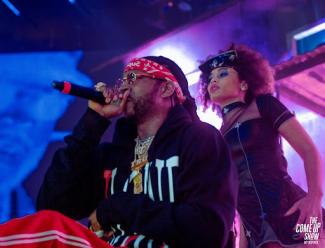
Usher’s Super Bowl performance put Black Atlanta artists on center stage, showcasing the depth of influence songs from the Southern city have had worldwide. But this influence expands beyond Usher and friends; it also shaped an entire subgenre of rap music that has taken over airwaves since.
Trap music is a force. It layers percussive sounds with rhythmic beats and Southern rap stylings. There are debates about exactly when and how trap began, but there’s no question about who helped shape the sound and make it the global powerhouse it is today.
Atlanta’s Outkast helped put southern hip-hop on the map and define its place in the genre’s musical narrative. Their sound wove into the mixtapes of people like T.I., Gucci Mane, and Young Jeezy, whose albums and popularity took off in the early 2000s.
The “Trap Trinity,” Jeezy, TI, and Gucci Mane, blended not just the sounds of southern hip-hop into their music but also profound lyrical truths about what trap life was, its mental effects, and the dreams of escaping it. They innovated hip-hop in a way that hadn’t been seen since the birth of gangsta rap and it continues to dominate today.
Over 20 years later, trap music is everywhere. The sound has permeated pop radio stations, EDM clubs in Europe, and even K-pop. The creativity and innovation of Black southern hip-hop artists have given rise to what is arguably the most popular subgenre of rap today.